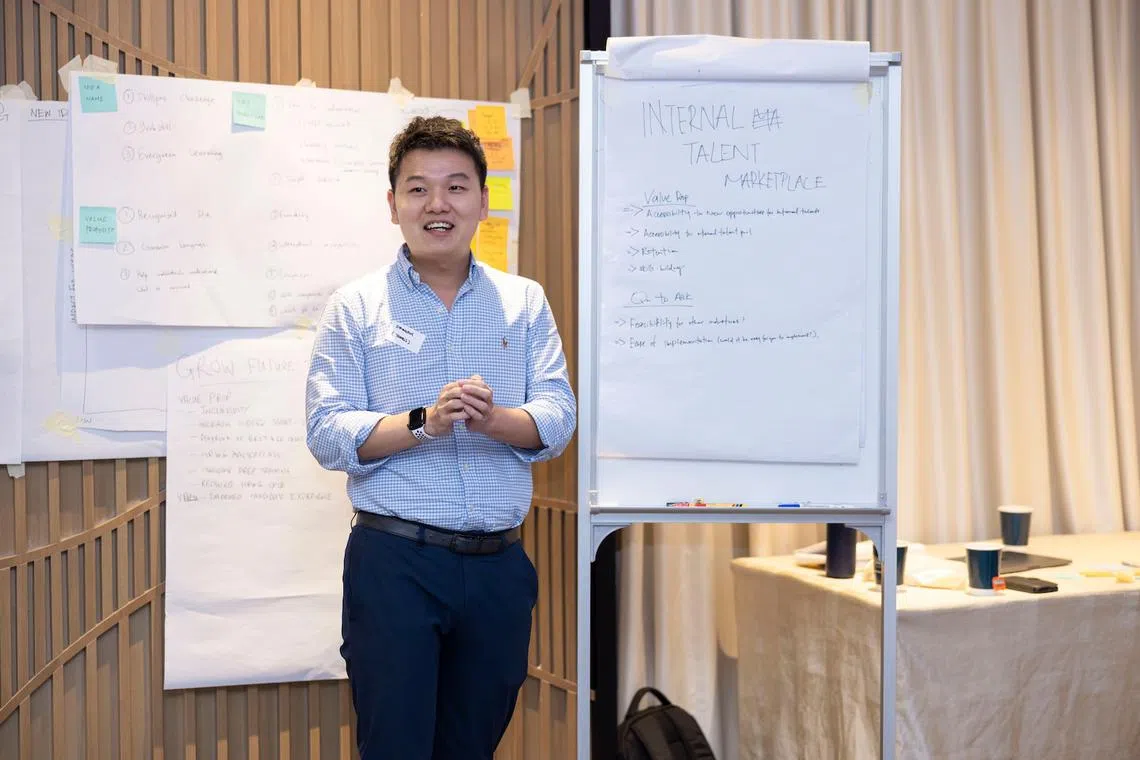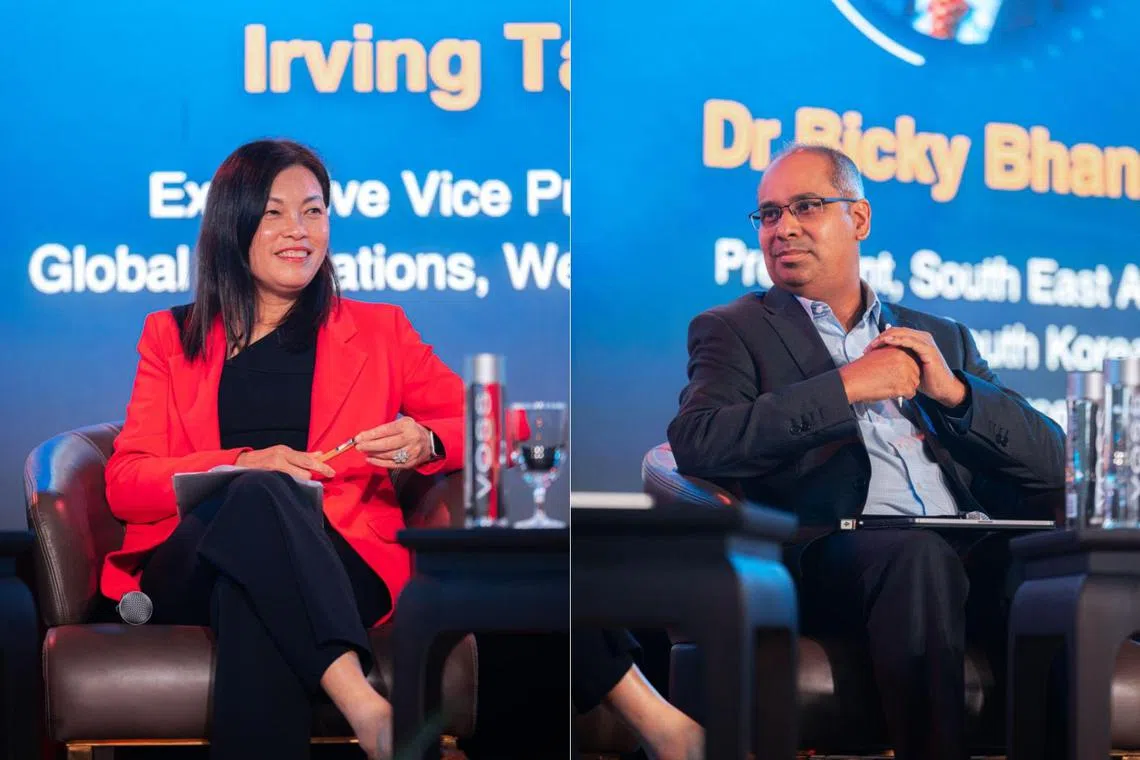Look at skills, not qualifications: How companies can get an edge in the hunt for talent
Amid an increasingly competitive job market, a team of industry representatives put forward solutions to help firms find, engage and retain
Kareyst Lin &
Timothy Kang
As a young company in the information and communications technology (ICT) sector, local tech consultancy firm Temus is well aware of the challenges in finding talent.
“We can have 10 open positions but we may only have seven applicants,” said Damian Tan, 32, the head of Talent Acquisition at Temus, founded in 2021.
It’s a challenge that’s familiar across the industry. According to a 2024 salary guide by recruitment agency Morgan McKinley, over 75 per cent of technology hiring managers said recruitment is competitive in Singapore, while a quarter cited a shortage of skilled candidates as a key challenge.
What was Temus’ solution? To look inward, said Tan. “If we can’t get talents externally, then we focus internally, which is to build capabilities for employees within the firm.”
This led the firm to create TalentForge in April, an artificial intelligence-powered platform to develop its workforce and promote internal mobility among its 450 employees.
Close to 400 are based locally, while the rest are at its offices in Vietnam, Hong Kong, India and the Czech Republic.
Navigate Asia in
a new global order
Get the insights delivered to your inbox.
The internal tool provides employees with an overview of their skills and outlines steps to achieve their professional goals by recommending relevant courses and training.
“It’s a win-win situation,” said Tan. “Employees would feel valued by developing their skills, and we can create that stickiness in retaining talents.”

Rethink requisites
Temus’ solution was driven by its participation in the Alliance for Action (AfA) on Widening Access to Talent.
Formed in January, the AfA is an initiative supported by the Ministry of Manpower and the Singapore National Employers Federation (SNEF). It brings industries together to develop solutions to increase talent competitiveness amid rising workforce constraints.
A 2024 report on talent shortages by US-based workforce solutions firm ManpowerGroup revealed that 79 per cent of Singapore employers surveyed reported difficulty in filling roles.
Furthermore, demographic shifts such as Singapore’s ageing population and record-low birth rates, coupled with stricter foreign labour policies, are adding to their workforce woes.
The AfA comprised over 20 members from the National Trades Union Congress, trade associations and chambers, the human resource community and employers from the ICT, manufacturing and retail sectors.
What does the AfA suggest to companies? To adopt a skills-first approach to hiring and developing talent.
It involves hiring based on skills rather than purely academic qualifications or past job experience, and using skills-first workforce development programmes to promote internal mobility and increase retention.
“With this, you have the opportunity to tap into people with hidden talents and potential,” said Aileen Tan, AfA co-lead and group chief people and sustainability officer at Singtel.
She explained that this approach takes the focus away from the “traditional method” of assessing based on requirements and qualifications, opening up new possibilities in the talent search.
Dr Bicky Bhangu, AfA co-lead and president of Rolls Royce South-east Asia, Pacific and South Korea, concurs.
“In addition to tapping a wider talent pool, we want companies to engage their existing talent as well,” said Dr Bhangu, who is also an SNEF council member.
He shared that by connecting an employee’s skills and potential with other areas within an organisation, companies can uncover in-house talent and carve new career pathways.
He added that stay-at-home mothers, seniors and students who are looking to participate in the workforce present an opportunity for employers.
“Yet, there isn’t a mechanism to allow them to access the link between the job itself and the role that they are looking for.”

Ease for SMEs
Over nine months, the AfA members conducted pilots within their respective industries and tested potential solutions.
As a result, the AfA identified four key areas and produced eight practicable recommendations for employers to widen their access to talent within, and outside the workforce (see below).
The goal is to not only shift employer mindsets, but also help resource-constrained small and medium-sized enterprises (SMEs) remain competitive.
“SMEs do not have the same capabilities as bigger companies, but they also desperately need better access to talent,” said Singtel’s Tan. “So the challenge was to create solutions that can be easily implemented.”
“With a (skills-first approach), you have the opportunity to tap into people with hidden talents and potential.”
Aileen Tan, AfA co-lead and group chief people and sustainability officer at Singtel
Dr Bhangu said that in doing so, SMEs would be at “a level playing field to be competitive amid a very challenging business environment”.
He added that as SMEs evolve and position themselves to adapt to macro trends, such as sustainability and digital transformation, they will need more talent.
“If we don’t have access to that talent, we can’t be competitive and we will not be around for a long duration.
”As an AfA member, Temus’ Tan shared how participating as an AfA member has influenced the company’s talent acquisition and retention strategies.
“Traditionally, it will just be posting a job advertisement when we need to look for people,” he said. “But we’ve started to approach it from a more holistic point of view, actively looking at skills internally and externally.”

- Click here to learn more about the Alliance for Action on Widening Access to Talent and to read its full report
This was produced in partnership with the Ministry of Manpower, in support of Career Health SG
Share with us your feedback on BT's products and services
